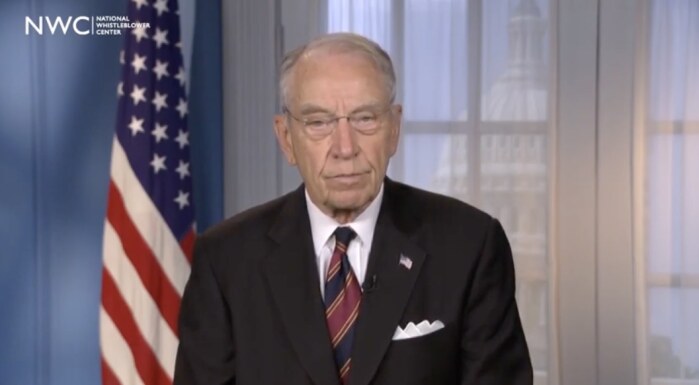Rick Morain is the former publisher and owner of the Jefferson Herald, for which he writes a regular column.
Federal government whistleblowers have a champion in the U.S. Senate: Republican Chuck Grassley of Iowa.
We can measure a politician’s sincerity about a specific issue or policy by how consistently he or she maintains that position, regardless of which party holds power. Through the years—decades, really—that Grassley has served in the U.S. Senate, he has always insisted that government employees who expose questionable dealings or negligent mismanagement by their superiors must be protected in their jobs, without fear of retaliation.
That’s particularly true when the employee’s specific job is to investigate such dealings. Those crucial public servants are the “inspectors general” of the various federal agencies.
Senator Grassley and Democratic Senator Maggie Hassan of New Hampshire accurately laid out how important inspectors general are to effective government in a letter they sent to President Joe Biden last week:
Inspectors General provide a vital service to the American taxpayer by rooting out waste, fraud, and abuse of federal funds and providing agencies with recommendations on how to be better stewards of public funds.
Grassley and Hassan noted that six federal agencies, some of them at the center of government activity, “await a presidentially-nominated, Senate-confirmed watchdog.” Those agencies include the State Department and the Treasury Department, which for more than 1,000 days have yet to have candidates nominated for Senate consideration.
The lengthy delay evolves from actions and inactions of both the Trump and the Biden presidencies.
The joint authorship of the Grassley-Hassan letter suggests that their effort is not partisan. During Democratic and Republican administrations, Iowa’s senior senator has shown his commitment to encouraging and protecting inspectors general.
In June 2020, Grassley refused to advance a pair of President Donald Trump’s nominees to important government positions until Trump provided “adequate reasons for the termination of the Intelligence Community and State Department inspectors general.”
In so doing, Grassley cited the 2008 Inspector General Act, which requires the president to give Congress a written explanation at least 30 days prior to removing an inspector general. The purpose of the act is to prevent politically-motivated terminations.
The statement Grassley submitted for the Congressional record at that time warned that “without sufficient explanation, the American people will be left speculating whether political or self-interests are to blame. That’s not good for the presidency or government accountability.” (Editor’s note: Grassley lifted his hold on the nominees two weeks later, even though the White House admitted Trump had retaliated against one inspector general for transmitting a whistleblower complaint to Congress.)
Grassley had similarly objected when Trump’s predecessor, President Barack Obama, removed an inspector general without notifying Congress in advance as required by the 2008 law. A court later ruled in Obama’s favor, stating that the president wasn’t required to provide additional reasons prior to removing the inspector general. Trump cited that ruling in defense of his refusal to explain details involving his 2020 removal of the two inspectors general.
So in March 2021, two months after Biden had taken office, a group of six senators from each party (including Grassley) reintroduced the Securing Inspector General Independence Act. The bill’s purpose was to clarify the 2008 Inspector General Act.
Specifically, that bill would limit the use of administrative leave for inspectors general during the 30-day notification period following the removal announcement. (Both Obama and Trump had employed administrative leave to sideline targeted inspectors general in their administrations.)
The bill also would require any acting inspectors general to be selected from among senior level employees within the watchdog community. In addition, a Grassley press release stated, “To protect the integrity of investigations and audits during the IG transition, the bill requires regular training to IG employees on their whistleblower rights.”
In October 2021, Republican Senator Rob Portman of Ohio, ranking member of the Senate Homeland Security and Governmental Affairs Committee, delivered opening remarks at the committee’s hearing on safeguarding inspector general independence and integrity. Portman proposed additions to the March bill that would further protect inspectors general.
In describing the bill, Senator Portman noted that “Many have worked on this, including Senator Grassley. We should notice his work.”
Portman noted that Biden had provided the names of several nominees to inspector general positions earlier in the year.
But as of last week, six of the permanent positions still remained unfilled, including those of the State Department and the Treasury Department. Those vacancies provoked last week’s letter from Grassley and Hassan to the president.
Iowans should know that Grassley’s work on this aspect of government goes back several decades. The final paragraph of Grassley and Hassan’s letter to the president underscores the matter’s importance:
The Council of the Inspectors General on Integrity and Efficiency estimated in fiscal year 2021 that the government could potentially save $62.7 billion if agencies implemented open recommendations made by IGs.
Grassley’s determined efforts to protect whistleblowers, including inspectors general, well deserve the praise they have received.
Top image: Screenshot of Senator Chuck Grassley speaking about whistleblowers in a video produced by the National Whistleblower Center in July 2021.

